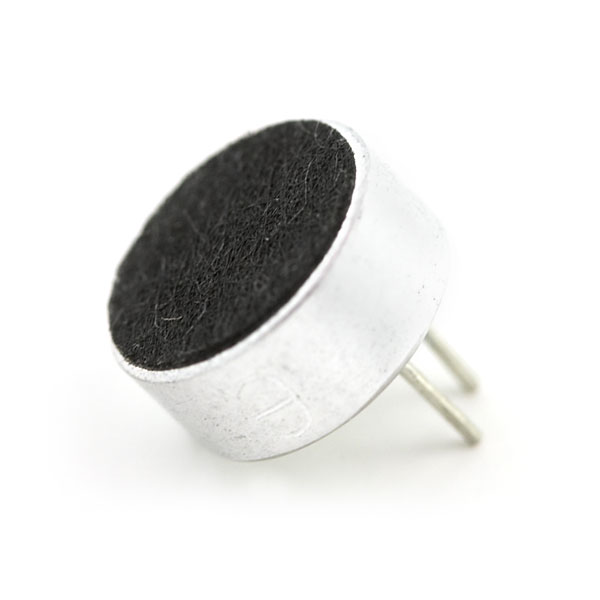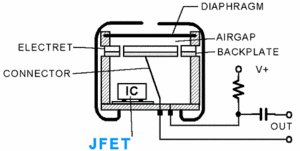...
Acoustic camera is camera with an array of microphones. Array of microphones is basically a group of microphones. Acoustic illustrates the source and intensity of the sounds.
Image 1. Acoustic camera with 32 microphones. (http://3.bp.blogspot.com/-F-iN3xofa-Y/TgJsJfCN5NI/AAAAAAAAE-I/ZSwA1WUeD1Y/s400/camara03.jpg)
How it works?
General
Each microphone in the array records audio stream of their own from specific position on the camera. This creates the microphones amount of streams. The position difference is stored in memory so that other microphones audio data is filtered from other microphones in the array.
...
http://en.wikipedia.org/wiki/Acoustic_camera
Electret microphone
Charasteristics
Image 2. Electret microphone (https://cdn.sparkfun.com//assets/parts/1/7/6/9/08635-03-L.jpg)
Electret microphone is omnidirectional. This meas that it can hear from all directions. Transistor works as transducer in the heart of the electret microphone. Electret microphone sensitivity is defined in datasheet as "(- 46 ± 2.0, ( 0 dB = 1V / Pa ) at 1K Hz)". Operating temperature the electret microphone is working is -20 to 60 degrees. Frequency rate is 100 - 10,000 Hz. Current depend on sound level. Maximum current is 0.5mA.
Transfer function of the electret microphone is the electrical force gained on the diaphragm:
F≈(E_dc+E_ac )^2-(E_dc+E_ac )^2=4E_dc E_ac
Where
E_dc = electret exhibited D.C potential
E_ac = applied signal voltage
Electret microphone is used in close range. Electret microphone quality can be made better by improving material and size.
Source of charasteristics:
http://dlnmh9ip6v2uc.cloudfront.net/datasheets/Sensors/Sound/CEM-C9745JAD462P2.54R.pdf
Interface electronic circuits
Image 2. Eletritet microphone (http://hades.mech.northwestern.edu/images/thumb/8/80/ElectretMicrophone.gif/300px-ElectretMicrophone.gif)
Electret microphones have two legs, one is ground and another is voltage. Electret microphone can be tested by oscilloscope to see what kind signal is coming out from different sound levels. To get results the signal is amplified from ten to hundred times.
Sound include noises. Filters can be done for noises programmatically. The A/D conversion is also done in the embedded system.
Source of Interface electronic circuits:
http://www.ti.com/lit/ds/symlink/opa344.pdf
https://www.sparkfun.com/datasheets/BreakoutBoards/Mic-Testing-v10.zip
Material and manufacturing
...



